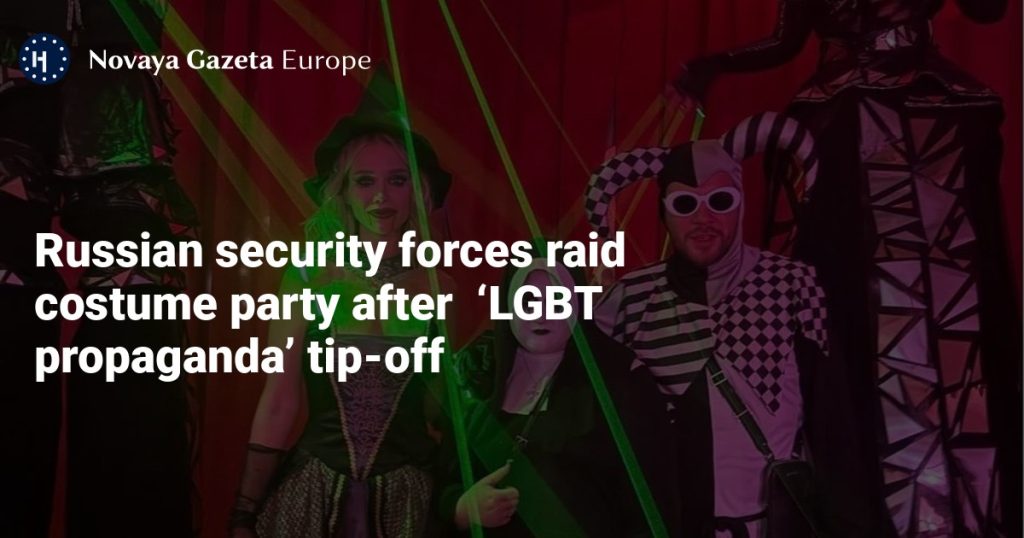Listen to the article
Russian authorities detained seven individuals after raiding a costume party in Tomsk, Siberia, according to reports from Telegram news channel Ostorozhno Novosti on Saturday.
The event, described as a popular annual “Sabbath party,” featured a circus theme this year with attendees dressed as clowns and female acrobats performing on the dance floor. According to the news channel Baza, the celebration had been underway for several hours when riot police suddenly arrived, bringing festivities to an immediate halt.
Law enforcement officers conducted extensive searches of the premises, examining 17 rooms and screening party attendees during an operation that lasted more than two hours before allowing people to leave. Eyewitnesses reported that officers prohibited anyone from recording the raid and demanded that existing footage be deleted.
According to Baza, the police intervention was prompted by an anonymous complaint alleging the event featured “LGBT propaganda.” This accusation carries significant weight in today’s Russia, where authorities have intensified their crackdown on what they classify as “non-traditional” gatherings.
The Tomsk raid follows a similar incident last month in Moscow, where police stormed a “kissing party” at a nightclub in the eastern part of the capital. These raids reflect a dramatic transformation in Russia’s urban nightlife, once celebrated internationally for its vibrancy and diversity.
The increasing frequency of such police actions coincides with the Russian Supreme Court’s 2023 ruling that outlawed the “international LGBT movement,” effectively criminalizing LGBTQ+ advocacy and expression. Since then, venues perceived as catering to queer communities or hosting events that challenge traditional values have faced mounting pressure and scrutiny.
Witnesses to these raids describe traumatic scenes where armed officers force attendees to lie face down on the floor, sometimes for hours, while documents and mobile phones are inspected. Reports of physical abuse and humiliation during these operations have become increasingly common.
Human rights organizations have expressed concern over the pattern of targeting social gatherings under vague accusations of promoting “non-traditional values.” Critics argue these raids represent a broader campaign to suppress social diversity and enforce conservative cultural norms through intimidation.
The crackdown has devastated what was once a thriving nightlife scene, particularly in major cities like Moscow and St. Petersburg, where clubs and venues have either closed or drastically changed their programming to avoid unwanted attention from authorities.
Local business owners in the entertainment sector report significant financial losses, with many establishments forced to implement strict self-censorship measures or rebrand completely to distance themselves from any association with LGBTQ+ clientele.
For residents of Tomsk, a university city with a historically vibrant cultural scene, the raid signals that the enforcement of these restrictive policies has reached beyond the major metropolitan centers into regional urban areas across Russia.
Social media reactions to the Tomsk incident reveal a divided public response, with some Russians supporting the authorities’ actions as defending traditional values, while others express concern about growing restrictions on personal freedoms and cultural expression.
Legal experts note that the vague definition of “LGBT propaganda” in Russian legislation allows authorities considerable discretion in determining what constitutes a violation, creating an environment of uncertainty for event organizers and participants alike.
As these raids continue, many Russians are adapting by organizing private gatherings in less visible venues, creating password-protected social media groups, and developing code words to communicate about events that might attract unwanted official attention.
Fact Checker
Verify the accuracy of this article using The Disinformation Commission analysis and real-time sources.




7 Comments
While I’m not familiar with the specifics of Russian laws around public gatherings, the reported details of this raid are quite concerning. Preventing people from recording the incident and demanding footage be deleted raises red flags about transparency and accountability. More information is needed to fully understand the context here.
This raid on a costume party seems like an egregious overreach by the Russian authorities. Using the pretext of ‘LGBT propaganda’ to shut down a harmless celebration is a clear abuse of power. It’s deeply troubling to see such heavy-handed tactics being employed against citizens over their personal choices.
I agree, the Russian government’s actions here are extremely concerning and appear to be politically motivated. This type of crackdown on individual freedoms is deeply worrying.
This heavy-handed crackdown on a costume party is quite concerning. The Russian authorities seem to be using the pretext of ‘LGBT propaganda’ to harass and intimidate people over their personal choices and expression. This type of oppressive behavior is deeply troubling.
The raid on this costume party is a worrying sign of the growing authoritarianism in Russia. Using the guise of fighting ‘propaganda’ to shut down a harmless celebration is a clear abuse of power. This heavy-handed response raises serious questions about civil liberties in the country.
I agree, the authorities’ actions here are completely disproportionate and appear to be politically motivated. This is a disturbing trend that undermines individual freedoms.
The Russian authorities’ response to this costume party is quite alarming. Raiding a harmless celebration and detaining people based on vague allegations of ‘LGBT propaganda’ is a clear abuse of power. This type of heavy-handed, repressive behavior is deeply troubling and raises serious questions about the state of civil liberties in the country.